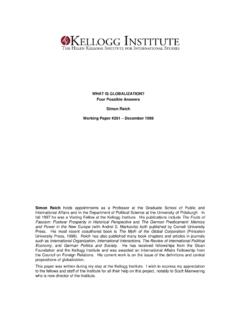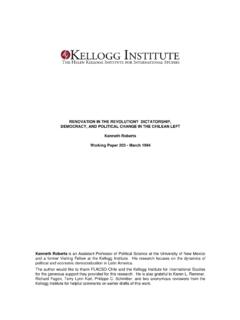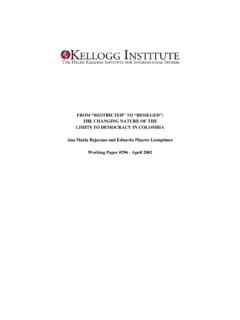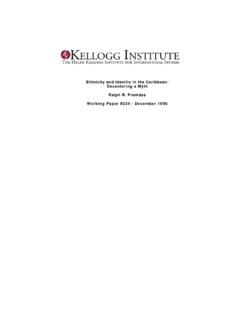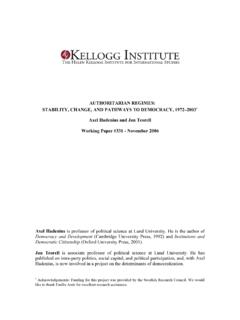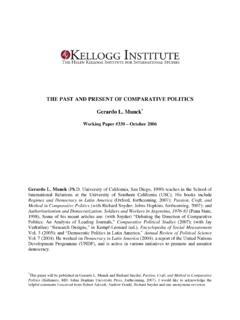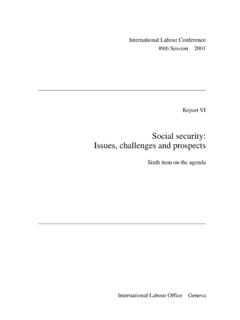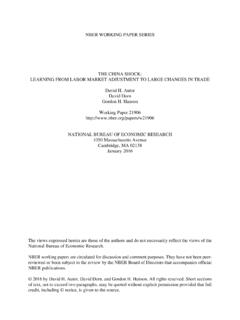Transcription of Regionalization, Globalization, and Nationalism
1 regionalization , globalization , AND Nationalism :Convergent, Divergent, or Overlapping?Arie M. KacowiczWorking Paper #262 December 1998 Arie M. Kacowicz is a Senior Lecturer in International Relations at the Hebrew Universityof Jerusalem, Israel. In the 1997/8 academic year he was a Concurrent AssistantProfessor and Visiting Fellow at the Kellogg Institute and the Kroc Institute forInternational Peace Studies. He is the author of Peaceful Territorial Change (Columbia,SC: University of South Carolina Press, 1994) and of Zones of Peace in the Third World(Albany, NY: State University of New York Press, 1998).
2 This is a revised version of a paper presented at the IPSA Study Group II: New WorldOrders? Workshop on Globalisms and Regionalisms, Center for Development and theEnvironment, University of Oslo, Norway, 7 August 1998. The author would like toacknowledge the hospitality of the Kellogg Institute for providing a stimulatingenvironment in which to write this paper examines the interaction among the three forces that shape world politics inthe contemporary system: globalization , regionalization , and Nationalism .
3 The mainthesis suggested here is that these three forces cannot be assessed in isolation,independently from one another, nor from a perspective of either convergence ordivergence among them. Rather, globalization , regionalization , and Nationalism shouldbe captured and studied as forces relative to and overlapping one another, sometimesantagonistic and sometimes cooperative toward each other but never harmonious. Thisargument is theoretically relevant both in the context of the world political economy andinternational security, with special reference to the phenomenon of pluralistic securitycommunities.
4 The Latin American case provides an empirical laboratory to test thesetheoretical art culo examina la interacci n entre los tres factores que dan forma a la pol ticamundial en el sistema contempor neo: la globalizaci n, la regionalizaci n y elnacionalismo. El principal argumento que aqu se sugiere es que el impacto de cada unade estas tres fuerzas no puede ser estimado aisaldamente, separando una de la otra, ytampoco desde una perspectiva de convergencia o divergencia entre estas trestendencias.
5 M s bien, la globalizaci n, la regionalizaci n y el nacionalismo deber an sercapturados y estudiados como fuerzas superpuestas y relacionadas; a veces de modoantag nico, otras de modo cooperativo, pero nunca armoniosamente. Este argumentoes te ricamente relevante tanto en el contexto de la econom a pol tica internacionalcomo en el de la seguridad mundial, especialmente con referencia al fen meno de lascomunidades de seguridad pluralistas. En este sentido, el caso de Am rica Latinaofrece un laboratorio emp rico para poner a prueba estas afirmaciones te paper examines the interaction among the three forces thatshape world politics in the contemporary system: Globalization, regionalization , and Nationalism .
6 The main thesis suggested here is thatthese three forces cannot be assessed in isolation, independently fromone another, nor from a perspective of either convergence or divergenceamong them. Rather, globalization , regionalization , and nationalismshould be captured and studied as forces relative to and overlapping oneanother, sometimes antagonistic and sometimes cooperative toward eachother, but never harmonious. This argument is theoretically relevant bothin the context of the world political economy and of international security(with special reference to security complexes and pluralistic securitycommunities).
7 In this sense I want to encourage our thinking about thephenomena of pluralistic security communities and to do so by showinghow the interaction of these three forces might make them possible. TheLatin American case will provide an empirical illustration to thosetheoretical paper is structured in four sections. First, I briefly define therather confusing and misleading concepts of globalization , Regionalization, and Nationalism . Second, I assess the possible linkages (convergent,divergent, and overlapping) among them.
8 Third, I examine how theemergence of pluralistic security communities epitomizes the complexrelationships among these three forces. Finally, I illustrate some of thetheoretical arguments with reference to the Latin American implication of the argument presented above is a plea forpluralism and a picture of indeterminacy regarding the mutual and multipleeffects of globalization , regionalization , and Nationalism . For instance,instead of referring to a single world order, we are witnessing today theemergence of a variety of new regional orders (Lake and Morgan 1997;Holm and Sorensen 1995).
9 Similarly, we should also qualify the global characterization of globalization : instead of a single one mechanismaffecting the entire world, we might also have to specify several ordifferent dimensions, affecting unevenly different regions. Hence, thosethree forces maintain complex and overlapping relationships with oneanother. Moreover, they are significant only in relative terms (in relation toone another) and dependent dialectically upon each KEY CONCEPTS: globalization , Regionalization, AND NATIONALISMG lobalizationWhat is globalization ?
10 There is a lot of confusion about the term,and about the rhetoric of the new world order following the end of theCold War. Hence, globalization can be conceived as a myth, a rhetoricaldevice, a phenomenon, an ideology, a reality, an orthodoxy, a both academic and popular discourses globalization has become one ofthe catchwords of the 1990s. In fact, globalization is a short form for acluster of related changes: economic, ideological, technological, andcultural. Economic changes include the internationalization of production,the greatly increased mobility of capital and of transnational corporations,and the deepening and intensification of economic interdependence.
